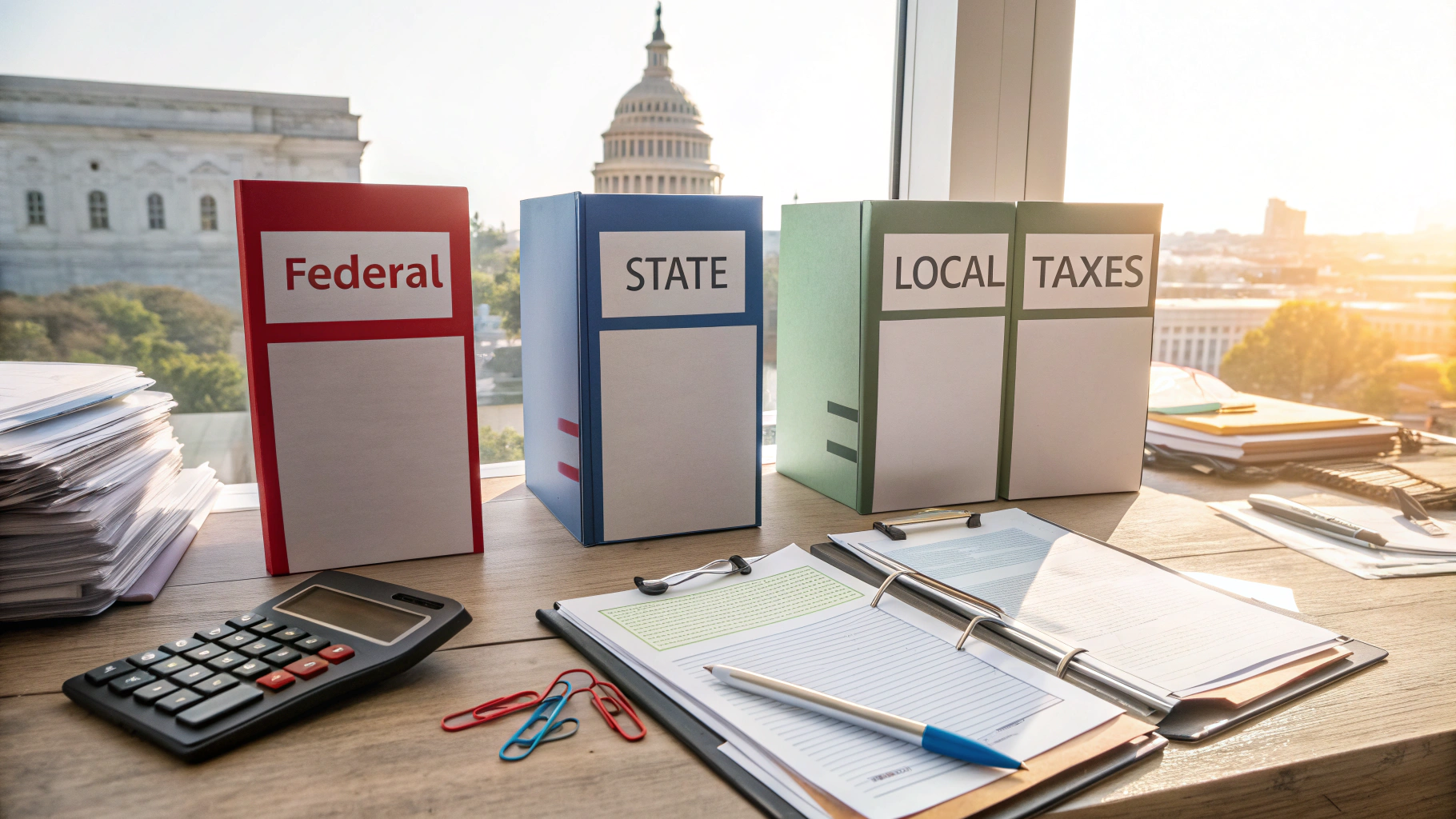Federal, state, and local taxes are all about funding various levels of government. Federal taxes, mainly income taxes, keep the lights on in Washington. State taxes vary wildly; some states tax you to the hilt, while others keep it flat and simple. Then there are local taxes—think property taxes and those surprise income taxes if you're in the right (or wrong) place. Each level has its quirks. Want to know more? Keep exploring.

Taxes. The word itself can send shivers down spines. But let's break it down. At the federal level, most of the government's cash comes from income taxes. Yep, that's right. The money you earn gets taxed. And don't forget about the state and local tax (SALT) deduction—big deal, right? Except, it's capped at a measly $10,000. Thanks, TCJA. Speaking of which, personal exemptions? Gone. Poof!
Taxes can be terrifying, but remember: income taxes fuel the federal machine, and personal exemptions are now a thing of the past!
Now, shifting gears to the state. Here, income taxes account for about 19% of general revenue. The rates can be wild—like a rollercoaster. Arizona's at 2.5%, while California goes all the way up to 13.3%. How nice. Some states toss around multiple tax brackets, while others just stick with a flat rate. California relies most on individual income taxes, generating a whopping 23% of state and local revenue in 2021. Individual income tax contributes the greatest amount to state revenue, underscoring its significance in funding essential services. State taxes are crucial as they generally support public education, infrastructure, and state welfare programs.
And guess what? They often play by their own rules. Just because the feds allow something doesn't mean states have to. Municipal bond interest? Yeah, states can tax that.
Let's not ignore local taxes. Most of their cash flow comes from property taxes and transaction taxes. Local income taxes? Only a handful of states let that happen, and even then, they often just ride the coattails of state taxes.
There are payroll taxes too, separate from state income taxes. Surprise! Local tax rates are all over the place.
Frequently Asked Questions
How Do Tax Brackets Work for Federal and State Taxes?
Tax brackets? Oh, they're a fun game of percentages!
Federal tax brackets are a progressive mess; the more you earn, the more they take. Rates range from 10% to 37%—yikes!
States play their own game, too. Some are flat, some progressive, and a few just say, "Nah, no income tax." It's a buffet of confusion!
Just remember, it's not what you make, but how much they want to take. Welcome to tax season!
What Deductions Are Available for Local Taxes?
Local tax deductions? Oh, they exist. Taxpayers can deduct local income taxes, sales taxes, and property taxes.
But here's the kicker: you can only claim up to $10,000. Choose wisely—either sales taxes or income taxes, not both.
And don't forget real estate and personal property taxes; they count too.
However, if you're hoping for a deduction on special benefit taxes, sorry, that's a no-go. Tax life is full of surprises, isn't it?
Can I File Taxes in Multiple States?
Absolutely, one can file taxes in multiple states.
It's a real joy if you've moved or worked in different places. You'll have to juggle part-year resident and nonresident returns, which is as fun as it sounds. Each state has its own rules, so good luck keeping track.
And don't forget about tax credits—those can save some headaches.
E-filing? Only three states at once. Who knew taxes could be such a delightful puzzle?
How Are Tax Rates Determined at Each Government Level?
Tax rates? Oh, they're set through a wild mix of legislative processes and economic whims.
Politicians huddle together, trying to balance revenue needs and taxpayer burdens. It's like a game of tug-of-war, really. They adjust for inflation and public policy goals, which sounds fancy but often means more money out of your pocket.
Local, state, or federal, they all have their quirks. And let's not forget the headaches of compliance! Good luck with that.
What Happens if I Don't Pay My Local Taxes?
Not paying local taxes? Get ready for a world of hurt.
Penalties and interest pile up like dirty laundry. Tax liens? Say hello to a public record that stomps on your credit score.
Collection agencies might come knocking, and local services could just vanish.
In extreme cases, legal action could be waiting in the wings.







